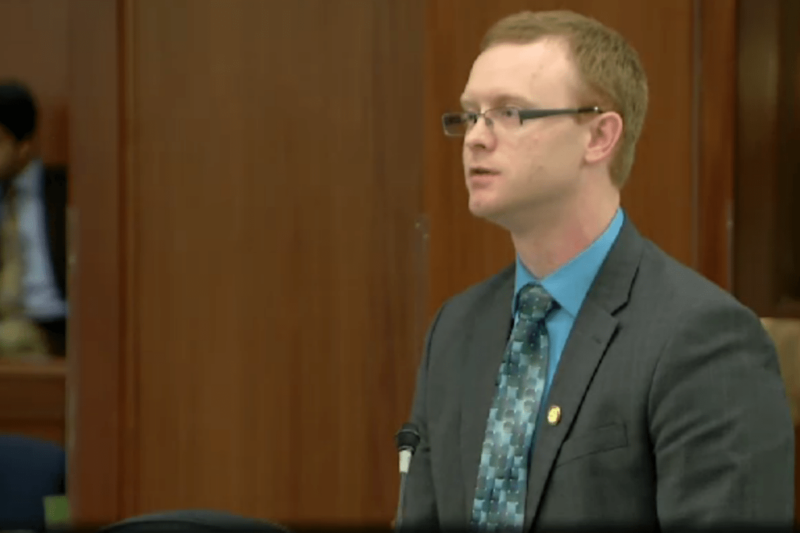Alaska Republican Claims Women Get Pregnant on Purpose for Free Seattle Trips
Nobody wants to see the Space Needle that badly.

Rep. David Eastman (R) of Wasilla, Alaska—where he, like Sarah Palin, can presumably see Russia from his house—jammed his foot in his mouth earlier this month when he made a wildly offensive claim about low-income people who rely on Medicaid to pay for medically necessary abortions.
“We have folks who try to get pregnant in this state so that they can get a free trip to the city, and we have folks who want to carry their baby past the point of being able to have an abortion in this state so that they can have a free trip to Seattle,” he said in an interview with the Associated Press.
It is true that Alaska’s state insurance program provides funding to low-income people for medically necessary abortions. It is also true that if those people need later abortion care, the state will fund a trip to Seattle, since Alaska does not offer second-trimester abortions, according to the CAIR project, an abortion fund serving the Pacific Northwest.
But the notion that women are purposefully getting pregnant or that they would maintain an unwanted pregnancy until it’s too late, all so they can go on some sort of abortion vacation, is insidious and offensive.
Nobody wants to see the Space Needle that badly.
Still, Republicans like Eastman have been fighting to narrow the definition of medically necessary in order to make it more difficult for pregnant patients on Medicaid to obtain abortion services.
In 2001, the Alaska Supreme Court ruled in State v. Planned Parenthood of Alaska that if Alaska is going to fund medically necessary health-care services for low–income people through Medicaid, then those medically necessary health-care services must include abortions.
As defined by the Alaska Supreme Court in 2001:
[T]he terms medically necessary abortions or therapeutic abortions are used interchangeably to refer to those abortions certified by a physician as necessary to prevent the death or disability of the woman, or to ameliorate a condition harmful to the woman’s physical or psychological health, as determined by the treating physician performing the abortion services in his or her professional judgment.
Republicans in Alaska sought to circumvent that decision in 2014 by passing a state law, SB 49, and a department of health and social services regulation that would have severely limited Medicaid coverage of abortions. The new law would have barred the Alaska Medicaid program from paying for abortion services unless the abortion services are medically necessary or the pregnancy was a result of rape or incest. The law redefined “medically necessary,” listing 22 specific conditions—plus risk of death—that would qualify a person to receive state funding for abortion care. Notably, none of those conditions included any consideration of mental illness.
In 2015, the Alaska Superior Court blocked that law and regulation in Planned Parenthood of the Great Northwest v. Streur, finding that both violated the equal protection clause, since criteria for an abortion under Medicaid were not applicable to any other service covered by Medicaid. An appeal is still pending in that case.
Though Eastman has only been a state representative since January, lawsuits in several other states have quibbled over the term “medically necessary,” and what it means for those who need funding for abortion care.
Eastman’s comments were not taken well, especially considering he made them in connection with a bill to raise awareness about sexual assault and child abuse.
He tacked on an amendment to a bill that had nothing to do with abortion, claiming that it would be wrong to discuss child abuse without mentioning abortion, according to AP. In his amendment, Eastman referred to abortion as the “ultimate form of child abuse.” (Has no one bothered to tell him that fetuses aren’t children?)
Eastman’s colleagues were not amused, and last week, voted to censure him—a formal condemnation that carries no other consequences. This makes Eastman the first member of the Alaska house to be censured.
Rep. Les Gara (D-Anchorage) said that he was not interested in playing “abortion politics” with a measure intended to honor women and protect children, according to AP.
“He’s made this an abortion fight now,” Gara said.
Another Anchorage representative, Ivy Spohnholz (D) said to Alaska Public Media, “When one member of this body brings the dignity of the institution into question, it’s incumbent upon all of us to act to defend it.”
“The representative from the northwestern part of the Mat-Su calls into question the character of women from rural Alaska and offended the dignity of all women,” she added.
In response to his censure, Eastman offered what at first seemed to be a sincere apology, saying that his comments weren’t intended to blame any woman or group.
“I did not want them to be used in any way that would hurt anyone,” he said. “I understand that people were hurt by them. And I’m very sorry that I said them. I’m very sorry that people were hurt,” he added.
But then he undercut his apology by blaming political correctness, according to Alaska Public Media.
“We have a choice as a society on whether we will lean more towards focusing on what is being talked about—what’s intended by a statement—or focusing more on how someone could have interpreted that statement,” Eastman said.
Uh, pal? You literally said that women are getting abortions so they can get a free trip to the city. There’s no misinterpreting that statement. It was clear. And it was offensive. And you should be ashamed.
Rather than relying on “society” to ferret out what you really meant to say when you claimed that pregnant people are going on abortioncations, you should watch your mouth. And maybe, while you’re at it, try to stop quibbling over the definition of just who needs an abortion, and how they get it.

